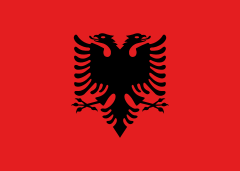Please tell us which country and city you'd like to see the weather in.
Kanun (Albania)
The Kanun is a set of traditional Albanian laws. The Kanun was primarily oral and only in the 20th century was it published in writing. There is only one Kanun since ancient times commonly referred to as the "Kanun of Leke", from which six later variations eventually evolved, categorized according to the area, the personality and their time of origin: Kanun i vjetër (English: Old Kanun), Kanuni i Lekë Dukagjinit (English: The Kanun of Lekë Dukagjini), Kanuni i Çermenikës (English: The Kanun of Çermenikë), Kanuni i Papa Zhulit (English: The Kanun of Pope Julius), Kanuni i Labërisë (English: The Kanun of Labëria) and Kanuni i Skenderbeut (English: Kanun of Skanderbeg) also known as Kanuni i Arbërisë (English: Kanun of Arbëria).
The Kanun of Skanderbeg is the closest in similarity with the Kanun of Lekë Dukagjini, and the latter is usually the most known and is also regarded as a synonym of the word kanun. The Kanun of Lekë Dukagjini was developed by Lekë Dukagjini, who codified the existing customary laws. It has been used mostly in northern and central Albania and surrounding areas formerly in Yugoslavia where there is a large ethnic Albanian population; Montenegro, Kosovo and Macedonia. It was first codified in the 15th century but the use of it has been outspread much earlier in time. It was used under that form until the 20th century, and revived recently after the fall of the communist regime in the early 1990s.

Albania
Albania (![]() i/ælˈbeɪniə/, al-BAY-nee-ə, or sometimes /ɔːlˈbeɪniə/, awl-BAY-nee-ə; Albanian: Shqipëri/Shqipëria; Gheg Albanian: Shqipni/Shqipnia, Shqypni/Shqypnia), officially known as the Republic of Albania (Albanian: Republika e Shqipërisë; Albanian pronunciation: [ɾɛpuˈblika ɛ ʃcipəˈɾiːs]), is a country in Southeastern Europe. It is bordered by Montenegro to the northwest, Kosovo to the northeast, the Republic of Macedonia to the east, and Greece to the south and southeast. It has a coast on the Adriatic Sea to the west and on the Ionian Sea to the southwest. It is less than 72 km (45 mi) from Italy, across the Strait of Otranto which connects the Adriatic Sea to the Ionian Sea.
i/ælˈbeɪniə/, al-BAY-nee-ə, or sometimes /ɔːlˈbeɪniə/, awl-BAY-nee-ə; Albanian: Shqipëri/Shqipëria; Gheg Albanian: Shqipni/Shqipnia, Shqypni/Shqypnia), officially known as the Republic of Albania (Albanian: Republika e Shqipërisë; Albanian pronunciation: [ɾɛpuˈblika ɛ ʃcipəˈɾiːs]), is a country in Southeastern Europe. It is bordered by Montenegro to the northwest, Kosovo to the northeast, the Republic of Macedonia to the east, and Greece to the south and southeast. It has a coast on the Adriatic Sea to the west and on the Ionian Sea to the southwest. It is less than 72 km (45 mi) from Italy, across the Strait of Otranto which connects the Adriatic Sea to the Ionian Sea.
The modern-day territory of Albania was at various points in history part of the Roman provinces of Dalmatia (southern Illyricum), Macedonia (particularly Epirus Nova), and Moesia Superior. The modern Republic became independent after the collapse of the Ottoman Empire in Europe following the Balkan Wars. Albania declared independence in 1912 and was recognized the following year. It then became a Principality, Republic, and Kingdom until being invaded by Italy in 1939, which formed Greater Albania. The latter eventually turned into a Nazi German protectorate in 1943. The following year, a socialist People's Republic was established under the leadership of Enver Hoxha and the Party of Labour. Albania experienced widespread social and political transformations during the communist era, as well as isolationism from much of the international community. In 1991, the Socialist Republic was dissolved and the Republic of Albania was established.
Albania (placename)
The toponym Albania may indicate several different geographical regions: a country in the Balkans; an ancient land in the Caucasus; as well as Scotland, Albania being a Latinization of a Gaelic name for Scotland, Alba. This article will cover etymology, as well as trace the usage of the toponyms and related toponyms and ethnonyms from their earliest known occurrence down to present times.
Albania (Caucasus)
Albania as the name of Caucasian Albania, a state and historical region of eastern Caucasus, that existed on the territory of present-day republic of Azerbaijan (where both of its capitals were located) and partially southern Dagestan.
However, unlike the names of the other two European countries, this name was an exonym given to them by the Romans, as no one knew what these inhabitants called themselves. Compare also the land in Caucasus called Iberia, with the Iberian peninsula in Europe.
Albania (Balkans)
Albania as the name of a region in the Balkans attested in Medieval Latin. It may derive from an ethnonym, Albanoi, the name of an Illyrian tribe. Some linguists propose a derivation from the Proto-Indo-European root *albho-, which meant 'white'; referring perhaps to the snow-capped mountains of Albania. Others think the source may be a non-Indo-European root *alb-, meaning "hill, mountain", also present in alp "mountain pasture".
Albania (disambiguation)
Albania is an independent state on the Balkan Peninsula in south-eastern Europe.
Albania may also refer to :
States and state subdivisions (Albania-related)
Radio Stations - Tirana
SEARCH FOR RADIOS
Podcasts:
Albania
ALBUMS
- Remember II released:

